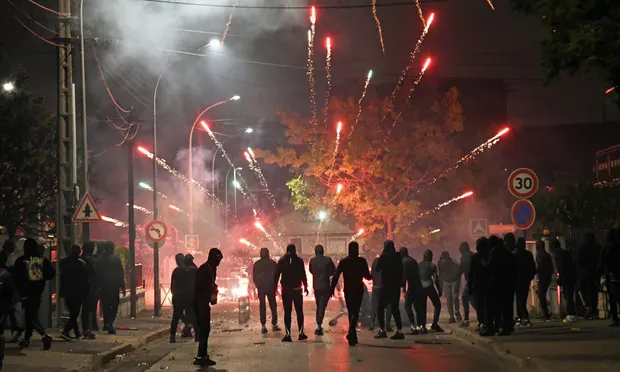T. Belman. I doubt its about “the growing gulf between haves and have-nots”.
All reports that I have read blame the riots on “many young, especially people of colour”. No one suggests that the rioters are predominantly Muslim nor do they identify who is promoting the riots. This article points to “vexed questions about France’s dogmatic insistence on racial assimilation, secularism and a one-size-fits-all identity. An increasingly diverse republic, its changing character deeply influenced by the colonial past, is still officially colour-blind.”
Diversity is not a strength as many on the left suggest. But how do you assimilate Muslim immigrants or accommodate them. Most host countries yield to their demands but this is not the answer either.
The answer is ban Muslim immigration.
The aggressive police tactics that led to the death of Nahel Merzouk reflect wider problems in French society
Right- and leftwing politicians, social scientists, analysts and commentators have rushed to variously condemn, explain, exploit and justify the fury and violence that erupted in many French cities after Tuesday’s fatal police shooting of Nahel Merzouk, a 17-year-old boy of north African descent. But some of the most revealing and insightful testimony came from Kendra, a resident of the Pablo Picasso estate in the Nanterre suburb of Paris, near to where the teenager was killed during a traffic-stop. There have been 21 fatal police traffic-stop shootings since 2020. Most of the victims were of black or Arab origin.
“For hours last night, there were young people everywhere, in groups on lots of different roads,” Kendra, 40, told Guardian correspondent Angelique Chrisafis. “I really think young people here consider themselves at war. They see it as war against the system. It is not just against the police, it goes further than that, otherwise we wouldn’t be seeing it all across France. It’s not just the police under attack but town halls and buildings being targeted… There’s a political dimension, a sense of the system not working. Young people feel discriminated against and ignored.”
Merzouk’s death, and the emergence of a video showing the moment he was shot at point-blank range inside his car, are uniquely distressing for his mother, family and friends. Yet the fact that this was not an isolated incident but one that reflects wider problems in French policing, race relations and society must be evident to all. In the broadest sense, Merzouk’s death has resurrected vexed questions about France’s dogmatic insistence on racial assimilation, secularism and a one-size-fits-all identity. An increasingly diverse republic, its changing character deeply influenced by the colonial past, is still officially colour-blind.
The aggressive, sometimes brutal methods employed by heavily armed, ill-disciplined French police are a longstanding problem. The issue was highlighted during the “yellow vest” street protests in 2018-19, when thousands of demonstrators (and many officers) were injured. Similar trouble arose during pension reform protests this year. Civil liberties organisations have been highly critical. The UN’s human rights watchdog weighed in again last week, saying Merzouk’s shooting was a “moment for [France] to seriously address the deep issues of racism and racial discrimination in law enforcement”.
The failure of France’s political classes to tackle this issue is one reason why many young, especially people of colour, believe themselves at war with “the system”. The inflammatory response of far-right politicians such as Éric Zemmour, who spoke in terms of “civil war” and “insurrection”, was disgracefully, typically racist. Yet Emmanuel Macron, France’s president, is not coming out of this well, either. Photographed at an Elton John concert while Paris burned, he was accused of irresponsibility. Scrabbling to regain control, he angered police unions by calling the shooting “inexcusable” even as his appeals to uphold law and order were widely ignored.
That police leaders feel justified in describing teenaged rioters as “vermin” and “savage hordes” is indicative of the dangerous, ever-widening gulf dividing France’s “haves” and “have-nots”.
Poverty, ghetto-like suburban estates, joblessness, limited life chances and social alienation are problems facing younger people in many developed countries, not least Britain. When chronic, unaddressed institutional racism in the justice system, in other state structures and society at large is added to this volatile mix, it’s little wonder uncontained explosions occur. What’s happening in France is a warning to all.
<
>
<
>
<
>
<
>
<
>




The problem isn’t racism. The problem is the number of people not gainfully employed nor employable. This is a cultural phenomenon due to children not being socialized effectively (i.e., not brought up with values that will lead to their success in society) either due to marital discord or parents who do not understand what is required in the country they have moved to. That leads to children failing in school and becoming unemployable.
It is not the responsibility of those who are working hard and living law abiding lives to “fix” the problem of unemployable people. If anything, welfare states merely mask the problem until the unemployable teens become unemployable adults.
The whole system of mass migration and multicultural society is collapsing because it was set up on a foundation of wishful thinking instead of reality from the start.
What is happening is the development of a class of people who are either criminal, marginal in functioning, or borderline mentally ill. This is not caused by racism, it is caused by multiculturalism and the welfare state.
It could have been predicted by the degree to which socialism/Communism has become normalized in France.
France might want to follow the economic model of countries such as Sweden, whose own experiments with socialism were abysmal failures and who then returned to free market capitalism with much success.